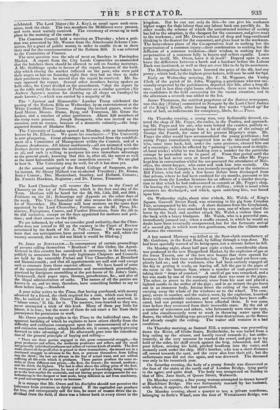ST. Jonx or JERUSALEM.—In consequence of certain proceedings of persons
calling themselves " Brothers " of this Order, the Agent- General in this country has considered it necessary, in the last week, publicly to announce that the only legitimate Chapters and Councils are held by the venerable Prelate and Vice Chancellor, at Brentford and Hammersmith ; and that all appointments are null and void except such as emanate from those superior officers. We have heard of some of the monstrously absurd mummeries and mountebank proceedings, practised by foreigners assembling at the pot-house of St. John's Gate, Clerkenwell, their paper stars, thrones, genuflexions, &c., and also of the illegal administration of oaths. The names of all the parties are known to us, and we may, therefore, have something further to say to them before long.---Standard.
A poor tailor writes to the Times, that having purchased, with money advanced by a friend, the cloth required for a coat, which cost him 1/. 16s., he carried it to Mr. Owen's Bazaar, where he only received, in "labour notes," 1/. 12s. for it. The masters, iron-hearted as they are, never attempted a trick of this kind. Many of them pay little for labour, it is true ; but the worst of them do not exact a fee from their journeymen for permission to work.
Mr. Owen yesterday replies in the Times to the individual case, the apparent hardship of which he explains to have arisen chiefly from the difficulty and confusion consequent upon the commencement of a new and extensive machinery, which hundreds are, it seems, eagerly pressing forward to take advantage of. He afterwards goes into the considera- tion of the general principle of buying and selling- " There are three parties engaged in this great commercial struggle,—the great producers and sellers, the moderate producers and sellers, and the small and generally individual producers and sellers of various kinds of wealth. The first make almost all the profit that is gained in these transactions; • the second are in a continued struggle to advance' to the first, or prevent themselves from falling into the third ; the last are always in the fear of actual want, and not seldom suffering all the evils which it produces. These parties produce the same ar- ticles at three different cost prices,—the first, the lowest ; the second, medium ; and the third, the highest. The last is often above the selling price of the first, in consequence of the parties, for want of capital or knowledge, being unable to go to the best market for materials,-and not having proper arrangements for ma- nufacturing in the cheapest or best mode, being deficient in aid from machinery, or good encouragement to carry on business."
It is strange that Mr, Owen and his disciples should not perceive the inference from premises so fairly stated. If the eapitalist can produce for less, and consequently sell for less, he must of course drive the in- dividual from the field, if there was a labour bank in every street in the
kingdom. But he can not only do this—he can give his workmen higher wages for their labour than any labour bank can possibly do. In other words, the scheme of which the uninstructed instinct of society has led to the adoption, is the cheapest for the consumer, and gives most to the workman ; and Mr. Owen's scheme of deep and long-continued thinking is the dearest for the consumer, and gives least to the workman. The benevolence plans of the Co-operatives lead to nothing but the perpetration of a common injury—their combination to nothing but the diffusion of a common weakness—their wisdom to nothing but the perpetuation of a common folly in buyers and sellers equally. Leave trade to itself, Mr. Owen, leave it to itself! Depend upon it, men knew the difference between a hawk and a handsaw before the Labour Bank was instituted, as well as they are ever like to do by its assistance.
The Metropolitan bakers have lowered the price of .the 41b. loaf one penny ; which loaf, by the highest-price bakers, will now be sold for Sid.
Early on Wednesday morning, Mr. F. M. Wegener, the Vestry Clerk of the parish of St. John, Wapping, a gentleman whowas versally respected by the parishioners, departed this life, after a long ill- ness; and in less than eight hours afterwards, there were no less than six candidates in the field canvassing for the vacant situation, and in the afternoon a seventh was added to the list.
James Thompson, the certified proprietor of the Satirist newspaper, was this day [Friday] committed to Newgate by the Lord Chief Justice of the King's Bench, after having been five weeks "locked up" for want of bail, on indictments for conspiracy, libels, &c.—Times.


























 Previous page
Previous page